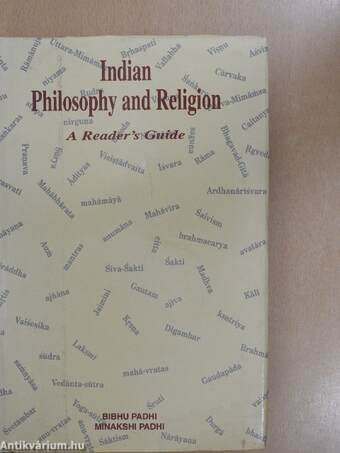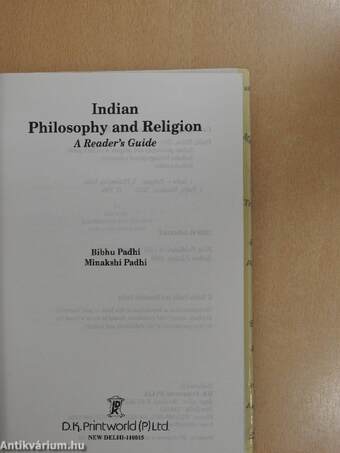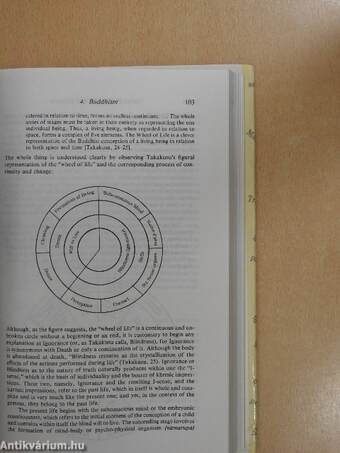1.072.879
kiadvánnyal nyújtjuk Magyarország legnagyobb antikvár könyv-kínálatát

VISSZA
A TETEJÉRE
JAVASLATOKÉszre-
vételek
Indian Philosophy and Religion
A Reader's Guide
| Kiadó: | D.K. Printworld (P) Ltd. |
|---|---|
| Kiadás helye: | Új-Delhi |
| Kiadás éve: | |
| Kötés típusa: | Vászon |
| Oldalszám: | 413 oldal |
| Sorozatcím: | |
| Kötetszám: | |
| Nyelv: | Angol |
| Méret: | 22 cm x 15 cm |
| ISBN: | 81-246-0116-X |
| Megjegyzés: | Fekete-fehér ábrákkal. |
naponta értesítjük a beérkező friss
kiadványokról
naponta értesítjük a beérkező friss
kiadványokról
Fülszöveg
In India, philosophy and religion are linked intimately, inseparably. Barring the Carvaka's materialistic school, every other school has concentrated not just on "the spiritual way oflife in the here-and-now", but on the "eventual spiritual salvation of man in relation to the universe". However, notwithstanding the centrality of its spiritual concerns, Indian philosophy has not altogether glossed over materialism; rather "ithasknown it, overcomeit, and has accepted idealism as the only tenable view" — whatever specific form that idealism might take: mythological, popular or technical.
Offering a brilliant prefatory discussion on the nature and thematic importance of the Vedas, the Upanisads, and the Bhagavad Gita, Padhis' book tries to capture India's fabulous philosophic genius, with comprehensive, at once objective account of all the six classical systems: the Nyaya, the Vais'esika, the Samkhya, the Yoga, the Pürva Mimamsa, and the Vedanta; and, in addition, of the Carvakas:... Tovább
Fülszöveg
In India, philosophy and religion are linked intimately, inseparably. Barring the Carvaka's materialistic school, every other school has concentrated not just on "the spiritual way oflife in the here-and-now", but on the "eventual spiritual salvation of man in relation to the universe". However, notwithstanding the centrality of its spiritual concerns, Indian philosophy has not altogether glossed over materialism; rather "ithasknown it, overcomeit, and has accepted idealism as the only tenable view" — whatever specific form that idealism might take: mythological, popular or technical.
Offering a brilliant prefatory discussion on the nature and thematic importance of the Vedas, the Upanisads, and the Bhagavad Gita, Padhis' book tries to capture India's fabulous philosophic genius, with comprehensive, at once objective account of all the six classical systems: the Nyaya, the Vais'esika, the Samkhya, the Yoga, the Pürva Mimamsa, and the Vedanta; and, in addition, of the Carvakas: the crass materialists. And of their numerous texts and their exponents: classical, medieval, and modern. Also unfoldinga panorama of the Hindu pantheonic divinities, the authors present Jainism and Buddhism: both as religións and philosophies — with focus on their world-views of ethics, major doctrines and significant metaphysical theories, among other aspects.
Uninfluenced either by the idealistic/eulogistic studies of certain Indian scholars, or by the damagingcritiques oftheir Western counterparts, the authors aim to achieve utmost objectivity in their presentation. Which, together with extensive bibliographic references and glossary of Sanskrit terms, makes the book an authentic guide for the discerning readers of Indian philosophy, religion and mythology. Vissza
Témakörök
- Filozófia > Témaköre szerint > Ontológia (Lételmélet) > Metafizika
- Filozófia > Témaköre szerint > Etika
- Idegennyelv > Idegennyelvű könyvek > Angol > Filozófia > Témaköre szerint > Ontológia (Lételmélet) > Metafizika
- Idegennyelv > Idegennyelvű könyvek > Angol > Filozófia > Témaköre szerint > Etika
- Vallás > Határtudományok > Filozófia
- Idegennyelv > Idegennyelvű könyvek > Angol > Vallás > Buddhizmus
- Idegennyelv > Idegennyelvű könyvek > Angol > Vallás
- Idegennyelv > Idegennyelvű könyvek > Angol > Vallás > Hinduizmus
- Vallás
- Vallás > Buddhizmus
- Vallás > Hinduizmus
Megvásárolható példányok
Nincs megvásárolható példány
A könyv összes megrendelhető példánya elfogyott. Ha kívánja, előjegyezheti a könyvet, és amint a könyv egy újabb példánya elérhető lesz, értesítjük.









